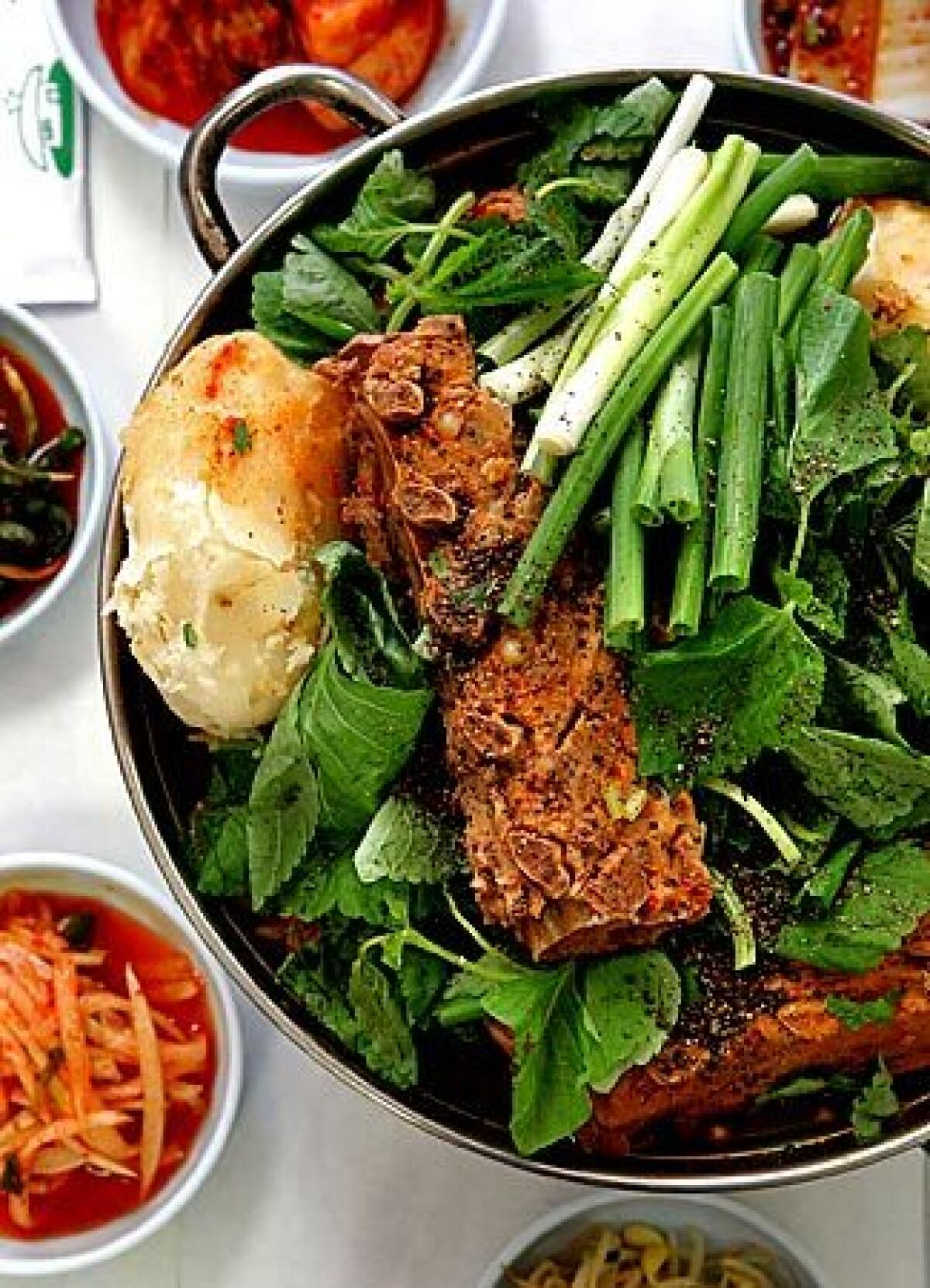Gamja-Gol does a great <i>gamjatang</i>

Gamja-Gol on Olympic Boulevard is as legendary a fixture in Koreatown as Canter’s, Langer’s or the Apple Pan are in their neighborhoods. It’s a place untouched by time, where the finish on the black lacquered tables is worn thin by years of use. Its crowded dining rooms, which span two connecting storefronts, are plain, save for slightly faded decorative photos of Korean dishes.
In each room a huge menu dominates one wall, but no one, it seems, ever reads these. Regulars come only for the house specialty: gamjatang. One of the world’s culinary marvels, the rustic, spice-laden soupy stew is based on slowly cooked pork back bones.
At peak mealtimes, a chorus of stentorian slurping sounds fills the air as customers perform the indelicate task of sucking off the tender meat hunks clinging to the bones (think of polishing off a plate of baby back ribs as a similar endeavor). Gamjatang may not appeal to those whose preference runs to filets and chops, but its fans subscribe to the old saw, “The closer to the bone the sweeter the meat.”
But pork spine isn’t the true star of gamjatang, which actually translates to potato stew. Each portion holds a huge, precisely trimmed and perfectly cooked whole potato that cruises the bottom of the serving dish like a submarine. As the stew bubbles away on the table, the potato slowly soaks up the lush sauce until it reaches saturation.
At lunchtime, most people order the individual servings that come in deep stoneware bowls, whereas the evening crowds get the communal version, gamjajungol, meaning potato stew warmed at the table. Groups of men or young carousers share bottles of soju poured over ice with fresh lemon squirts as they tuck into orders, stabbing the bottom of the pot to be sure they get a good-size chunk of the sauce-soaked potato.
When you order the gamjajungol, the waitress places a wide, heavy pan on the tabletop brazier holding already cooked bones and potatoes poking out from the orange-red sauce. A towering tangle of deep red-edged fresh perilla leaves (a mild-tasting cousin of shiso) crowns the top, melding into the stew as it warms.
Short-grain rice studded with red beans comes alongside. When the meat and potatoes are gone, you can practice your Korean by asking for rice stewed with the remaining sauce and a bit of kimchi with the request: “baap bokka joo-se-yo.”
Gamjatang‘s origins go back to the days when it was common fare for Korea’s railroad workers. As hearty, nourishing, cheap sustenance, it supposedly bolstered strength. But few family cooks could prepare the pork spines at home in the days of primitive kitchens. Instead, gamjatang became the province of vast public marketplaces like Namdaemun at Seoul’s southern gate. Booths and tiny hole-in-the-wall restaurants in the 24-hour market dished up servings for tired shopkeepers, merchandise haulers and even shoppers.
Pork spine bones were considered second-class citizens, like cuts the French would term abats de boucherie, more or less what most Americans consider scraps or byproducts. Although not classy, they add a wallop of meaty flavor and succulent body to a stew’s broth.
A small gamjajungol costs $24.95 and serves two or even three. Few other items at Gamja-Gol can be recommended, possibly because most of the effort in this kitchen goes into the jungol. But for the sake of variety, the savory vegetable pancake, pajeon, or the rice-based chile-sauced casserole, bibimbap, make fine contrasting accompaniments.
Location: 3003 W. Olympic Blvd., No. 107, Los Angeles, (213) 381-6446
Price: Individual servings of gamjagol, $7.99 (lunch), $9.99 (dinner); gamjajungol, $24.99 to $34.99; bibimbap (No. 11 and No. 27 on the menu), $7.99; vegetable pancake, $5.
Details: Open 11 a.m.-10:30 p.m. daily. Visa and MasterCard. Beer, wine and soju. Limited lot parking; street parking.
More to Read
Eat your way across L.A.
Get our weekly Tasting Notes newsletter for reviews, news and more.
You may occasionally receive promotional content from the Los Angeles Times.










